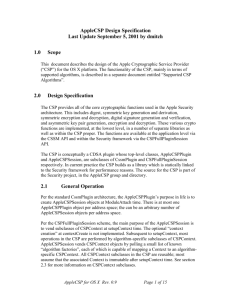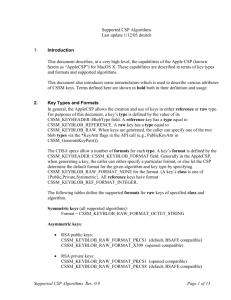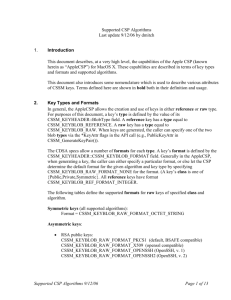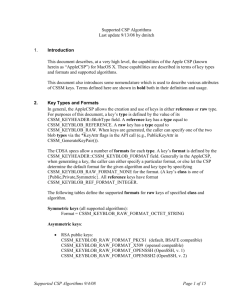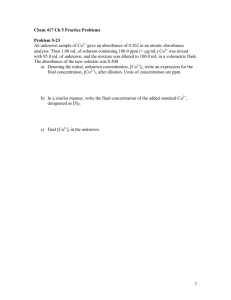Supported CSP Algorithms
advertisement
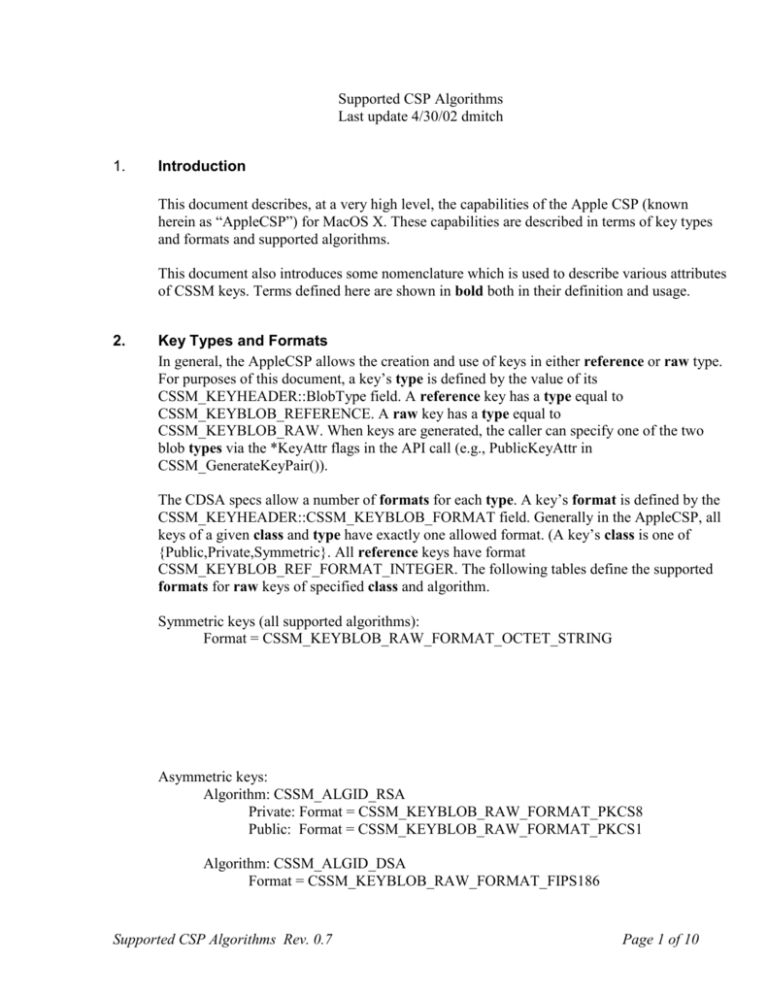
Supported CSP Algorithms
Last update 4/30/02 dmitch
1.
Introduction
This document describes, at a very high level, the capabilities of the Apple CSP (known
herein as “AppleCSP”) for MacOS X. These capabilities are described in terms of key types
and formats and supported algorithms.
This document also introduces some nomenclature which is used to describe various attributes
of CSSM keys. Terms defined here are shown in bold both in their definition and usage.
2.
Key Types and Formats
In general, the AppleCSP allows the creation and use of keys in either reference or raw type.
For purposes of this document, a key’s type is defined by the value of its
CSSM_KEYHEADER::BlobType field. A reference key has a type equal to
CSSM_KEYBLOB_REFERENCE. A raw key has a type equal to
CSSM_KEYBLOB_RAW. When keys are generated, the caller can specify one of the two
blob types via the *KeyAttr flags in the API call (e.g., PublicKeyAttr in
CSSM_GenerateKeyPair()).
The CDSA specs allow a number of formats for each type. A key’s format is defined by the
CSSM_KEYHEADER::CSSM_KEYBLOB_FORMAT field. Generally in the AppleCSP, all
keys of a given class and type have exactly one allowed format. (A key’s class is one of
{Public,Private,Symmetric}. All reference keys have format
CSSM_KEYBLOB_REF_FORMAT_INTEGER. The following tables define the supported
formats for raw keys of specified class and algorithm.
Symmetric keys (all supported algorithms):
Format = CSSM_KEYBLOB_RAW_FORMAT_OCTET_STRING
Asymmetric keys:
Algorithm: CSSM_ALGID_RSA
Private: Format = CSSM_KEYBLOB_RAW_FORMAT_PKCS8
Public: Format = CSSM_KEYBLOB_RAW_FORMAT_PKCS1
Algorithm: CSSM_ALGID_DSA
Format = CSSM_KEYBLOB_RAW_FORMAT_FIPS186
Supported CSP Algorithms Rev. 0.7
Page 1 of 10
Algorithm: CSSM_ALGID_FEE
Format = CSSM_KEYBLOB_RAW_FORMAT_NONE (DER)
= CSSM_KEYBLOB_RAW_FORMAT_OCTET_STRING
(raw bytes)
Note that any key which is generated by the CSP, in any legal type and format, can be used in
any call which accepts that key class and algorithm. E.g., whenever an RSA public key is
called for, the app may pass in a raw or reference key.
FEE keys can be generated in one of two formats; the default is FORMAT_NONE, which is a
DER-encoded key format. To obtain FEE keys in FORMAT_OCTET_STRING, one has to
specify additional context attributes via the CSSM_ATTRIBUTE_PUBLIC_KEY_FORMAT
and CSSM_ATTRIBUTE_PRIVATE_KEY_FORMAT attributes.
Also note that if performance is of interest, the use of raw RSA and DSA keys is deprecated.
Better performance is obtained using reference keys. There is no such advantage for
symmetric keys.
Supported CSP Algorithms Rev. 0.7
Page 2 of 10
3.
Key Generation
The following tables list the supported algorithms for the specified key generation functions:
CSSM_GenerateKey
Algorithm
CSSM_ALGID_DES
CSSM_ALGID_3DES_3KEY
CSSM_ALGID_RC2
CSSM_ALGID_RC4
CSSM_ALGID_RC5
CSSM_ALGID_SHA1HMAC (for MAC only)
CSSM_ALGID_AES
CSSM_ALGID_ASC
Key size in bytes
8
24
1..128
1..512
1..255
20..256
128, 192, 256
1..64
CSSM_GenerateKeyPair
Algorithm
CSSM_ALGID_RSA
CSSM_ALGID_DSA
CSSM_ALGID_FEE:
CSSM_ALGID_DH
Key size in bits
>= 512; key size mod 16 == 0
>= 512
See below
512 <= keySize <= 2048
FEE Key Generation
FEE keys can only be generated in a limited number of discrete sizes. Additionally,
two parameters may optionally be specified when generating FEE key pairs. These
parameters define the elliptic curve upon which subsequent elliptic algebra is
performed. The parameters are known as “prime type” and “curve type”. (A discussion
of the significance of these parameters is outside the scope of this document.) These
parameters, both of which have default values for any given (legal) key size, can be
specified as additional attributes in the key generation context passed to
CSSM_GenerateKeyPair. The attribute types and values can be found in
<Security/cssmapple.h>. The prime type is specified via attribute type
CSSM_ATTRIBUTE_FEE_PRIME_TYPE; the curve type is specified via attribute
type CSSM_ATTRIBUTE_FEE_CURVE_TYPE.
A complete list of legal key sizes and curve parameters follows. The default curve
each key size with multiple sets of curve parameters is shown; when specifying key
size, prime type, and curve parameters, only enough info to unambiguously identify
the curve is needed.
Key Size (bits)
31
Supported CSP Algorithms Rev. 0.7
Prime Type
Mersenne
Curve Type
Montgomery
Page 3 of 10
31
127
128
161
161
192
Mersenne
Mersenne
FEE
FEE
General
General
Weierstrass (default)
Montgomery
Weierstrass
Weierstrass (default)
Weierstrass
Weierstrass
Diffie-Hellman Key Generation
Diffie-Hellman (D-H) key pair generation involves either the specification or the
generation of D-H algorithm parameters. The contents and meaning of these algorithm
parameters is beyond the scope of this document; suffice it to say the D-H algorithm
parameters are encapsulated in an opaque blob in the form of a CSSM_DATA. This
parameter blob can be passed into the CSP at CSSM_CSP_CreateKeyGenContext
time (via the Params argument); it can be calculated explicitly by the CSP via
CSSM_GenerateAlgorithmParameters, which returns the calculated parameters to the
caller (as well as adding the calculated parameters to the key generation context), or it
can be implicitly calculated by the CSP at D-H key generation time if no parameters
have been specified in the context. For two parties to perform D-H key exchange, they
must use the same D-H algorithm parameters. Distribution of D-H parameters, in the
clear and in public, does not compromise the security of the D-H key exchange
mechanism in any way and is in fact very common. Calculation of D-H algorithm
parameters is a rather time-consuming process - it takes about 90 seconds on an 800
MHz G4 to calculate algorithm parameters for 1024-bit D-H keys - so systems which
perform D-H key exchange typically do not calculate these parameters very often certainly not once for each key pair.
CSSM_DeriveKey
Key Derivation algorithms (AlgorithmID):
CSSM_ALGID_PKCS5_PBKDF2
CSSM_ALGID_DH
Derived key algorithm (DeriveKeyType)
The legal key sizes are the same as those shown for
CSSM_GenerateKey.
CSSM_ALGID_DES
CSSM_ALGID_3DES_3KEY
CSSM_ALGID_AES
CSSM_ALGID_RC2
CSSM_ALGID_RC4
CSSM_ALGID_RC5
CSSM_ALGID_ASC
CSSM_ALGID_SHA1HMAC
CSSM_DeriveKey parameters
Supported CSP Algorithms Rev. 0.7
Page 4 of 10
Parameters for CSSM_ALGID_PKCS5_PBKDF2 key derivation are placed in
a CSSM_PKCS5_PBKDF2_PARAMS struct, a pointer to which is passed to
CSSM_DeriveKey in the Params argument. (The Params->Length field must
be set to sizeof(CSSM_PKCS5_PBKDF2_PARAMS)). The
CSSM_PKCS5_PBKDF2_PARAMS .PseudoRandomFunction field must
currently be set to CSSM_PKCS5_PRF_HMAC_SHA1. All of these structs
and values are defined in <Security/cssmtype.h>. This algorithm does not have
any CSMS_KEY as an input, so the BaseKey argument of
CSSM_CSP_CreateDeriveKeyContext is NULL.
The Params field for Diffie-Hellman (D-H) key exchange is the public key
blob of the party with whom one is performing key exchange. In other words,
Alice and Bob both generate a D-H key pair. Each sends the other party the
KeyData blob of their public key. Bob uses Alice's public key blob as the
Params field for his CSSSM_DeriveKey call. Alice uses Bob's public key blob
as the Params field for her CSSSM_DeriveKey call. Each use their own private
key as the BaseKey in the CSSM_CSP_CreateDeriveKeyContext call.
Supported CSP Algorithms Rev. 0.7
Page 5 of 10
4.
Cryptographic Operations
Symmetric Encryption/Decryption
Note “PKCS5/7 padding” means that either PKCS5 or PKCS7 padding may be specified.
The two are identical for 8-byte block ciphers.
Algorithm
CSSM_ALGID_DES
Modes (CSSM_ALGMODE_xxx)
Notes
CBCPadIV8
Requires PKCS5/7 padding
Requires an 8-byte IV
CBC_IV8
Requires an 8-byte IV
ECBPad
Requires PKCS5/7 padding
ECB
CSSM_ALGID_3DES_3KEY_EDE
CBCPadIV8
Requires PKCS5/7 padding
Requires an 8-byte IV
CBC_IV8
Requires an 8-byte IV
ECBPad
Requires PKCS5/7 padding
ECB
CSSM_ALGID_AES
CBCPadIV8
Requires PKCS7 padding
Requires a block-sized IV
CBC_IV8
Requires a block-sized IV
ECBPad
Requires PKCS7 padding
ECB
NOTE: AES allows block sizes of 16, 24, and 32 bytes. The default is 16 bytes.
The application can specify other block sizes via a
CSSM_ATTRIBUTE_BLOCK_SIZE attribute in the symmetric context.
NOTE: the AES implementation has been heavily optimized for the case of 16-byte
keys and blocks.
CSSM_ALGID_RC4
CSSM_ALGID_RC5
NONE
CBCPadIV8
CBC_IV8
ECBPad
ECB
No options
Requires PKCS5/7 padding
Requires an 8-byte IV
Requires an 8-byte IV
Requires PKCS5/7 padding
Asymmetric Encryption/Decryption
Encryption algorithm
CSSM_ALGID_RSA
CSSM_ALGID_FEED
CSSM_ALGID_FEEDExp
Supported CSP Algorithms Rev. 0.7
Required key algorithm
CSSM_ALGID_RSA
CSSM_ALGID_FEE
CSSM_ALGID_FEE
Page 6 of 10
The FEE encryption algorithms do not require (or accept) the specification of a mode or of a
padding specification. They implement a custom padding algorithm.
The RSA algorithm allows for an optional mode and padding (mode and padding are
independent). Padding can be CSSM_PADDING_NONE or CSSM_PADDING_PKCS1.
Specifying CSSM_PADDING_NONE is not recommended unless the programmer really
knows what they are doing; note that with CSSM_PADDING_NONE, the input size for both
encrypting and decrypting must be exactly the same as the key size.
RSA encryption and decryption also allow an optional mode argument (which must be
manually added to the asymmetric context via CSSM_UpdateContextAttributes()). These
optional modes are CSSM_ALGMODE_PUBLIC_KEY and
CSSM_ALGMODE_PRIVATE_KEY. Normally, RSA encryption is performed with a public
key; RSA decryption is performed with a private key. In the absence a mode attribute
specifying otherwise, these operations will fail with a
CSSMERR_CSP_INVALID_KEY_CLASS error if performed with the improper key class. It
is possible to perform RSA encryption with a private key by specifying
CSSM_ALGMODE_PRIVATE_KEY, and RSA decryption using a public key by specifying
CSSM_ALGMODE_PUBLIC_KEY. (These operations are actually "raw" RSA signature
operations.)
Digital signature and verify
The following algorithms are supported, shown with the required key type.
Signature algorithm
CSSM_ALGID_SHA1WithRSA
CSSM_ALGID_MD5WithRSA
CSSM_ALGID_RSA (raw; see note)
CSSM_ALGID_SHA1WithDSA
CSSM_ALGID_DSA (raw)
CSSM_ALGID_FEE_MD5
CSSM_ALGID_FEE_SHA1
CSSM_ALGID_SHA1WithECDSA
CSSM_ALGID_FEE (raw)
CSSM_ALGID_ECDSA (raw)
Required key algorithm
CSSM_ALGID_RSA
CSSM_ALGID_RSA
CSSM_ALGID_RSA
CSSM_ALGID_DSA
CSSM_ALGID_DSA
CSSM_ALGID_FEE
CSSM_ALGID_FEE
CSSM_ALGID_FEE
CSSM_ALGID_FEE
CSSM_ALGID_FEE
Note: “Raw” sign and verify is used to sign or verify a digest which is calculated by the app
separately from the sign/verify operation. Raw RSA sign and verify require the specification
of the digest algorithm at Sign/Verify time. This is done via the “DigestAlgorithm” to the
CSSM_SignData and CSSM_VerifyData functions.
Supported CSP Algorithms Rev. 0.7
Page 7 of 10
Digest
CSSM_ALGID_MD5
CSSM_ALGID_SHA1
Outsize = 16 bytes
Outsize = 20 bytes
CSSM_ALGID_SHA1HMAC
CSSM_ALGID_SHA1HMAC_LEGACY
Outsize = 20 bytes
Outsize = 20 bytes
MAC
The CSSM_ALGID_SHA1HMAC_LEGACY algorithm is backwards compatible
with the SHA1HMAC algorithm from the Cheetah implementation of the CSP. This
implementation, in the BSAFE library, was actually faulty in that it produced different
results for the same data input if updates were performed on different boundaries.
Unfortunately, Cheetah keychains are not usable unless we can verify their MACs
with this legacy algorithm. Obviously future use of this algorithm to actually generate
MAC values is deprecated.
Supported CSP Algorithms Rev. 0.7
Page 8 of 10
Wrap/Unwrap key
You can wrap any key with any other key, as long as the CSP understands those keys. The
only exception is that AES can not be used as the wrapping algorithm. Both
CSSM_WrapKey() and CSSM_UnwrapKey() expect either a symmetric context or an
asymmetric context, depending on the key doing the wrap/unwrap. Set up the context as if you
were doing an encrypt/decrypt (see above for modes and restrictions; a padding mode must
generally be used.). The output of a WrapKey operation is a wrapped key
(CSSM_KEYBLOB_WRAPPED), as is the input for an UnwrapKey operation. In addition,
NULL wrap/unwrap is supported. A NULL wrap converts a reference key into a raw key. A
NULL unwrap converts a raw key into a reference key. Both require a symmetric context,
with no key, algorithm CSSM_ALGID_NONE, mode CSSM_ALGMODE_NONE.
Pseudo Random Number Generation (CSSM_GenerateRandom())
The CSP supports one PRNG algorithm, ALGID_APPLE_YARROW. This algorithm uses a
version of Yarrow, originally written by Counterpane Labs, modified for the OS X platform.
Specifying a seed in the cryptographic context is optional; if present, the seed data is added to
the current entropy pool but does not fully specify the state of the Yarrow PRNG. (This
operation, in which seed data is added to the entropy pool, is only possible when the current
process is running as root.) Note that specifying the same seed in multiple calls to
(CSSM_CSP_CreateRandomGenContext(), CSSM_GenerateRandom()) will not result in the
generation of repeatable pseudorandom numbers.
Supported CSP Algorithms Rev. 0.7
Page 9 of 10
Revision History
Version
0.1
0.2
0.3
Date
4/18/00
5/16/00
7/13/00
0.4
0.5
10/25/00
4/26/01
0.6
9/5/01
0.7
4/30/02
Changes
Initial distribution.
Updated for alpha release of CSP.
Added CSSM_ALGID_3DES key generation and derivation.
Added CSSM_ALGID_3DES_3KEY_EDE encrypt/decrypt.
Removed CSSM_ALGMODE_ECB modes from feedback ciphers.
Cleaned up IV specification.
Added ALGID_APPLE_YARROW PRNG.
Added AES symmetric encryption.
Added ASC; added signature algorithms; modified modes for
symmetric encryption algorithms
Added CSSM_ALGID_SHA1HMAC_LEGACY
Added raw DSA, FEE, and ECDSA signatures
Added Diffie-Hellman Key gen and DeriveKey
Added CDSA_PADDING_NONE option for RSA
Added CSSM_ALGMODE_{PUBLIC,PRIVATE}_KEY for RSA
Supported CSP Algorithms Rev. 0.7
Page 10 of 10
